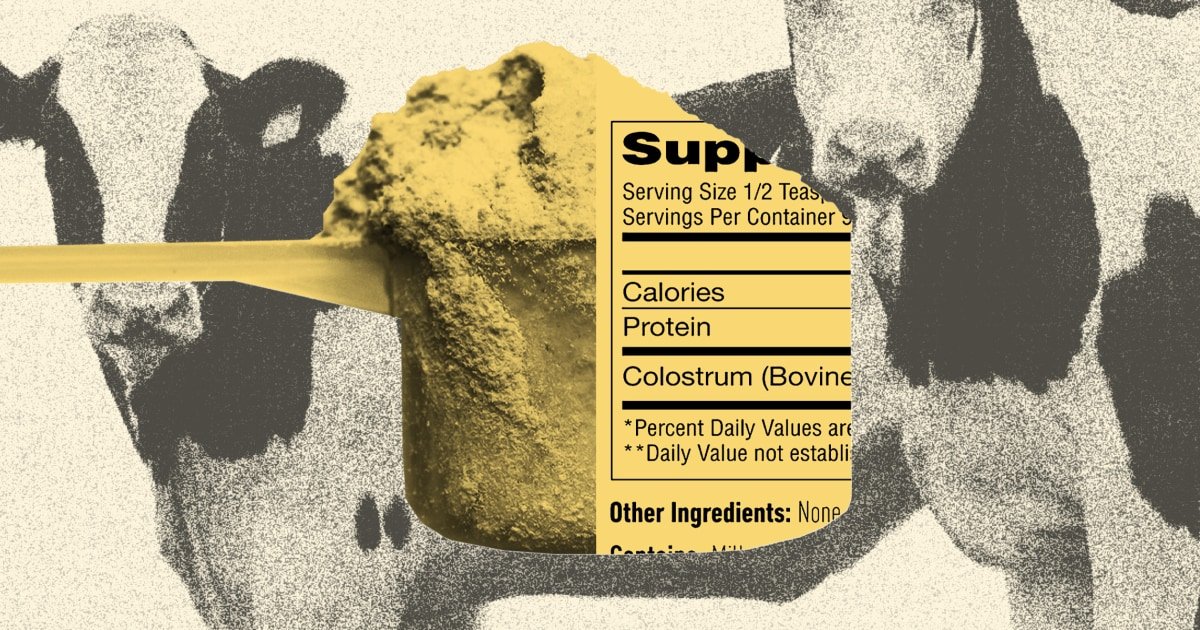Should you add colostrum to your daily diet?
On social media, influencers add spoonfuls of the powder to drinks. On podcasts, ads for the supplement tout it for a number of benefits: better immunity, better gut health, weight loss, and exercise recovery.
“Colostrum has been one of the most popular supplements over the past year,” a GNC spokesperson wrote in an email. In GNC’s upcoming “Anti Trend Report,” colostrum supplements were highlighted as one of the biggest supplement trends of the year.
Colostrum, sometimes called “liquid gold” because of its honey-like appearance, or “starter kit” for babies, is a crucial part of newborn development.
But what about adults? And what happens if that colostrum comes from a cow and not a human?
Here’s everything you need to know about colostrum supplements and whether they’re worth it.
What is colostrum?
Colostrum is an early form of breast milk that is produced immediately after birth.
It is intended to support the development of newborns and contains essential nutrients to boost their immune system, support their gastrointestinal system, and aid their overall growth.
Compared to so-called mature milk, the type of milk produced after colostrum, colostrum is richer in proteins, fats, vitamins, minerals and peptides. It occurs for about five days after birth.
Dr. Pieter Cohen, an associate professor at Harvard Medical School and a general internist at Cambridge Health Alliance, said colostrum contains certain antibodies and compounds that are important for child development.
“Colostrum contains many things that are good for babies of each species,” she said. “Human babies will be exposed to things that can help, like immunoglobulins and other proteins in colostrum that stimulate the immune system. These are really good as babies are developing their own immune system.”
Other studies have shown the importance of colostrum for babies in forming the gut microbiome and reducing the risk of allergies.
However, colostrum supplements are not made from human breast milk. Most are made from cow’s milk and sold as bovine colostrum. Some colostrum supplements are made from goat milk.
Why do people take colostrum and what does the research say?
There is a lot of interest in colostrum to help with inflammation, particularly in athletes, said Daniel Fabricant, president and CEO of the Natural Products Association, a supplement industry trade group. He also cited gut health as a benefit.
(Manufacturer added that colostrum supplements are not intended to cure, treat or mitigate diseases. “It is always important to differentiate something that is a health and wellness product from something that cures, treats or mitigates diseases,” he said.)
In a review article published last year in the journal Frontiers in Immunology, researchers said many studies reported positive effects for athletes taking the supplement, including supporting muscle recovery, boosting immunity after intense exercise and healing injuries, although they added that more research is needed. The review was funded by a dairy company.
Another review noted improvements in gastrointestinal problems such as diarrhea. However, the authors wrote that there was “limited evidence” on the effects of colostrum on intestinal health, “with conflicting findings.”
Wesley McWhorter, a registered dietitian and spokesperson for the Academy of Nutrition and Dietetics, said the research on colostrum supplementation is too early to make bold claims.
“Most of this research, still very preliminary, is early. There are no large-scale studies, so there is no solid evidence,” McWhorter said. Still, he said he’s interested to see where the investigation goes.
In many cases, studies are funded by companies that sell colostrum.
Richard Bloomer, dean of the College of Health Sciences and director of the Dietary Supplements and Nutraceuticals Research Center at the University of Memphis, said factors in each study — the source of the supplement, its dosage and who the subjects were — vary, which can affect the results.
Cohen said he doesn’t think the research is extensive enough yet and doesn’t recommend colostrum supplements.
He added that supplements can vary by manufacturer and brand, and that quality assurance is lacking.
“So even if there were one or two studies on a specific product, it doesn’t mean that product today is made in the same way as the one that was studied,” he said.
Can the same benefits be obtained without colostrum?
The research on colostrum seems most promising for athletes, who have their sleep, diet and exercise “regulated,” McWhorter said. But for the average person, he said, there are other ways to achieve the same benefits.
McWhorter recommended a “food first” approach.
“Focus on your diet first, exercise second, and pay attention to the other parts,” he said. “And that’s really where you should be spending your time, instead of taking supplements. There’s no magic pill right now.”
Benefits like those promised by colostrum can be achieved through lifestyle changes, such as diet, exercise, and regular sleep.
Bloomer said consumers should evaluate what they are willing to spend their money on.
“Could you justify an extra $2, $3, $5 a day for a little potential benefit? Maybe you’d be better off spending that $5 on a bunch of fruits and vegetables and trying to improve your immune function that way,” he said.









